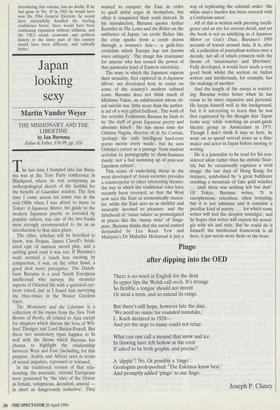Japan looking sexy
Martin Vander Weyer
THE MISSIONARY AND THE LIBERTINE by Ian Buruma Faber & Faber, £16.99, pp. 310 The last time I bumped into Ian Buru- ma was at the Tory Party conference in Blackpool, where he was composing an anthropological sketch of the faithful for the benefit of Guardian readers. The first time I came across his name was in the mid-1980s when I was about to move to Tokyo: A Japanese Mirror, his guide to the modern Japanese psyche as revealed by popular culture, was one of the two books most strongly recommended to me as an introduction to that alien place.
The other, scholars will be horrified to know, was Shogun, James Clavell's brick- sized epic of samurai sword play, and a rattling good read it was too. If Buruma's work seemed a touch less exciting by comparison, it was, on the other hand, a good deal more perceptive. The Dutch- born Buruma is a cool North European intellectual who surveys the steamier aspects of Oriental life with a quizzical eye- brow raised, just as I found him surveying the blue-rinses in the Winter Gardens foyer.
The Missionary and the Libertine is a collection of his essays from the New York Review of Books, all related to Asia except for chapters which discuss the lives of Wil- fred Thesiger and Lord Baden-Powell. But these two missionary types happen to fit well with the theme which Buruma has chosen to highlight the relationship between West and East (including, for this purpose, Arabia and Africa) seen in terms of sexual impulses, repressed or released.
In the traditional version of that rela- tionship, the muscular, rational Europeans were possessed by 'the idea of the Orient as female, voluptuous, decadent, amoral in short as dangerously seductive'. They wanted to conquer the East in order to quell sinful urges in themselves, but often it conquered their souls instead. In his introduction, Buruma quotes Arthur Koestler in The Lotus and the Robot on the ambience of Japan: 'an erotic flicker like the crisp sparks from a comb drawn through a woman's hair— a guilt-free eroticism which Europe has not known since antiquity'. The image has resonance for anyone who has sensed the power of that particular kind of Eastern electricity.
The ways in which the Japanese express their sexuality, first explored in A Japanese Mirror, are developed here in essays on some of the country's modern cultural icons. Buruma does not think much of Mishima Yukio, an exhibitionist whose rit- ual suicide was 'little more than the pathet- ic act of a very gifted buffoon'. The work of the novelist Yoshimoto Banana he finds to be 'the stuff of great Japanese poetry and absolute kitsch'. He has more time for Oshima Nagisa, director of Ai No Corrida, `perhaps the only intelligent hard-core porno movie every made', but he sees Oshima's career as a passage 'from student activism to pornography to show-business dandy: not a bad summing up of post-war Japanese culture'.
This sense of underlying decay in the most developed of Asian societies provides a counterpoint to other interesting themes: the way in which the traditional roles have recently been reversed, so that the West now sees the East as economically muscu- lar, while the East sees us as slothful and incurably devoted to pleasure. and the falsehood of 'Asian values' as promulgated in places like the 'nanny state' of Singa- pore. Buruma thinks that the social control demanded by Lee Kuan Yew and Malaysia's Dr Mahathir Mohamad is just a way of replicating the colonial order: 'the white man's burden has been covered with a Confucian sauce'.
All of this is written with piercing intelli- gence and an eye for curious detail, and yet the book is not as satisfying as A Japanese Mirror or God's Dust, Buruma's 1989 account of travels around Asia. It is, after all, a collection of journalism written over a decade, not all of which connects with the theme of 'missionaries and libertines'. Fully developed, it would have made a very good book whilst the section on Indian writers and intellectuals, for example, has the makings of another.
And the length of the essays is restrict- ing: Buruma writes better when he has room to be more expansive and personal. He keeps himself well in the background, but it is interesting to learn that he was first captivated by the thought that 'Japan looks sexy' while watching an avant-garde theatre group in Amsterdam in 1971. Though I don't think it says so here, he went on to spend several years as a film- maker and actor in Japan before turning to writing.
He is a journalist to be read for his con- sidered ideas rather than his stylistic flour- ish, but he occasionally captures a vivid image: the last days of Hong Kong, for instance, symbolised by 'a great bulldozer crushing a mountain of fake gold watches . . . until there was nothing left but dust'. Of Tokyo, Buruma writes, 'It is cacophonous, relentless, often irritating, but it is not inhuman and it contains a peculiar kind of poetry . . . for which some writer will feel the deepest nostalgia', and he hopes that writer will express his nostal- gia with wit and style. But he could do it himself: the intellectual framework is all here, it just needs more flesh on the bone.


































































 Previous page
Previous page